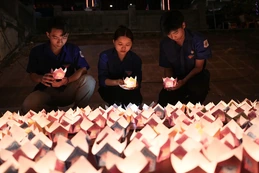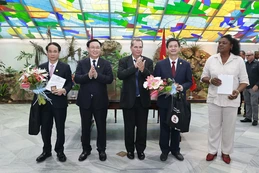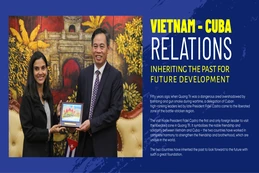Khe Sanh’s coffee, connecting people to Quang Tri Province
Early November 2023, when the sun shone on the western hills of Huong Hoa District, marked the beginning of coffee harvesting.
At the time, the first tour to coffee farms in Khe Sanh offered visitors unforgettable memories of coffee branches being heavily bent by ripe fruits.
It was the first well-organized agricultural tourism product introduced by Quang Tri Province and Huong Hoa District’s Khe Sanh Town.

Khe Sanh coffee products.
Since then, six tours have been arranged, attracting many visitors from other provinces and cities across Vietnam as well as other countries such as Japan, and the Netherlands.
“One special thing about this tour is that tourists can participate in the process of harvesting, preparing, and enjoying coffee as farmers,” said Tran Thai Thien – a member of Khe Sanh community tourism group.
The coffee farms chosen in this tour all cultivate coffee and turn coffee into a local specialty, he said, adding that the tour brings visitors new experiences to visitors, and connects the past with the present.

Visitors try producing coffee at a local farm.
“As an agro-tourism product, Khe Sanh coffee tour bonds people from different regions together,” he said.
Knowing about Ta Con Airport through history, but it was the first time Nanami, a Japanese living in Hai Duong Province, had come to Khe Sanh since the national unification 50 years ago. It was all different from her imagination.
By joining Khe Sanh Coffee tour, Nanami said that she has the opportunity to hear the story of coffee and war, and that she will always remember that peaceful day.

A visitor tries tasting the smell of local coffee.
Thy Phuong, the owner of Khe Sanh Valley Farm, has run the tour since the very first days.
She said that foreign tourists are very excited to experience stages from harvesting the fruits to processing and tasting the end items.
Japanese people are most concerned about coffee quality and health issues, so they carefully learn about the coffee production process. They also purchase a lot of products and send them to their homes, Phuong said.

A tourist tries making his coffee cup.
“Many domestic coffee businesses have also come for this tour. A business owner in Long Xuyen City, An Giang with a coffee distribution system for all the western region and Ho Chi Minh City has ordered six tons of Liberica coffee after experiencing the tour,” she said.
“Due to the limited production capacity, we had to divide the order into several shipments”, she added.

Travelers attempt to make coffee on their own.
Harro Boekhold, a 25-year-experienced tourism expert from PUM - the international development support of the Ministry of Foreign Affairs of the Netherlands, was the one who consulted local authorities to develop the tour.
According to him, Khe Sanh as an attractive destination for both domestic and international travelers. However, local authorities and people have little knowledge and idea of true agricultural tourism.
To develop agro-tourism in Quang Tri, it must come from local practical needs in diversifying tourism products based on advantages of available potential, he said.

Coffee beans harvested for production.
The Quang Tri Investment, Trade and Tourism Promotion Agency (IPA) has asked PUM to provide professional consultancy services on identifying opportunities for agricultural tourism in Quang Tri province, especially Khe Sanh, Huong Hoa, he said.
Harro added that agro-tourism plays an important role in increasing local people’s income, creating jobs for the youth to prevent leaving their native land, and disseminating knowledge about the important role of agriculture to the people.
The Dutch specialist had a three-day field trip to Khe Sanh and participated in the agricultural tourism economics workshop in Huong Hoa. He also spent time working with a group of coffee farmers in Khe Sanh. On that basis, he proposed turning coffee into a local agricultural tourism product.

Tourists enjoy the story of Khe Sanh coffee.
But coffee is not the only product. Khe Sanh is famous for being where the fiercest battles took place during the war, so to make a difference, it is necessary to link coffee-related activities with historical monuments in Khe Sanh, according to Harro.
War is a matter of the past, but based on that past, this land today has been filled with green sprouts, of which coffee is one, he said.
Furthermore, coffee also brings high economic value, therefore, “Make coffee, not war” is introduced as a slogan to promote agricultural tourism activities in this area, he said.
Long-term strategy
To build connection and widespread the message of peace values, there must be a long-term strategy to help agricultural tourism in Huong Hoa secure a place in the Vietnam tourism map.

A coffee plantation in Khe Sanh Town, Huong Hoa District.
According to Harro, Quang Tri is famous for the demilitarized zone tours. Apart from beaches in the East and natural, mountainous areas in the West, historical sites are the main resources for tourism. Therefore, Quang Tri should build a separate tourism profile for marketing and promotion purposes, preferably related to war history.
Currently, an agro-tourism project in Huong Hoa District has been established with the support of PUM, divided into stages in which Harro takes the role of consultant. According to him, to start an agricultural tourism project in a short time, IPA and the Khe Sanh community-based tourism group should focus on developing agricultural tourism rather than eco-tourism or nature tourism.

Khe Sanh is famous for being the battlefield during the war.
The target audience is domestic tourists and foreigners living and working in Vietnam, Harro said.
He proposed two models a half-day or a one-day tour for domestic tourists and a one-week tour for international tourists, focusing on business partners.

Harro Boekhold makes his presentation at a agro-tourism conference in October 2023.
To attract domestic tourists, related parties we should establish connections with local travel agencies and tour companies, he advised, adding that international business travelers can be reached by connecting with the international incentive trip market and organizations such as The Specialty Coffee Association, and their branches in Europe and the US.
In addition, it is necessary to organize training classes for the Khe Sanh community tourism group on tour guiding skills, storytelling, English, safety, and health issues in welcoming tourists, the PUM expert said.

The Hien Luong Bridge where divided Vietnam into two halves in the war.
According to the plan, phase four of the project will be a gradual withdrawal strategy for local people to take over, operate independently, and run the business with sustainability, Harro said.
Harro provided consultancy on the tourism development project with small-scale coffee farmers for local people in Kilimanjaro, Tanzania, East Africa. After 5 years, the project has reached the top five outstanding tourism products in the country with a three-day two-night tour being operated by a local private company and grows day by day.
Harro hoped that one day it will also happen in Khe Sanh, Huong Hoa soon.
Phan Hoai Huong - Huy Anh
4:29:02:2024:22:22 GMT+7








